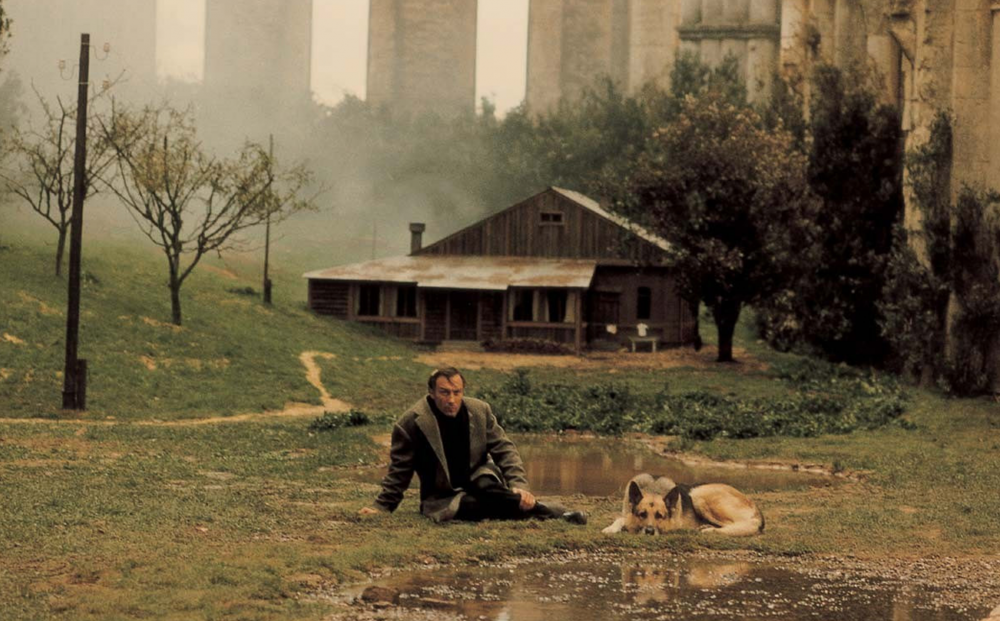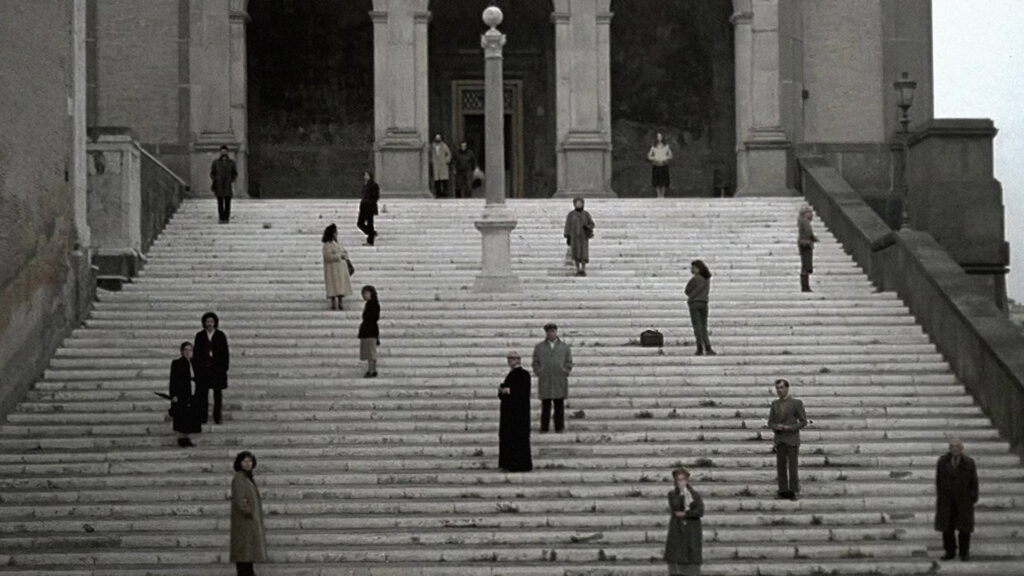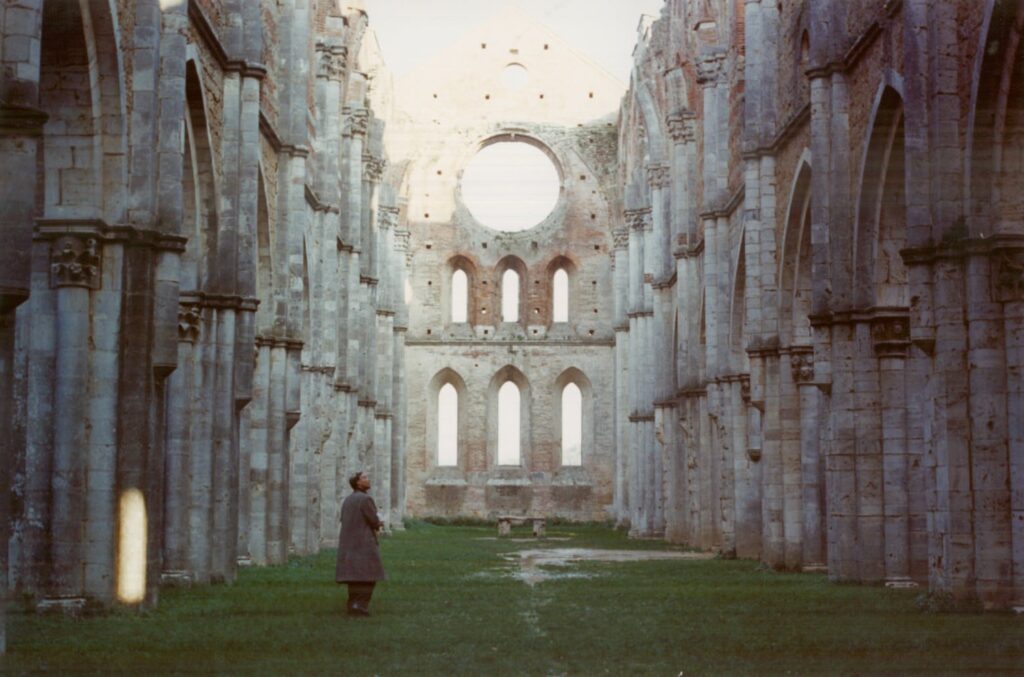| Lars Johnson |

Nostalghia plays at the Trylon Cinema from Sunday, June 30th, through Tuesday, July 2nd. Visit trylon.org for tickets and more information.
Cinema is an art form that is still largely in its infancy. Andrei Tarkovsky’s meditative and groundbreaking films pose many questions. From the ennui present in Stalker that probes our souls and interrogates our collective morality to the existential crises of faith seen in his final picture The Sacrifice, Tarkovsky also explored numerous themes in his masterpiece Nostalghia. Throughout each silent camera movement, the legendary filmmaker lays it out with meticulous craft so that each individual viewer can discover the work for themselves. The central theme is humanity’s spiritual fulfillment and demonstrating modern mankind’s destructive path. His filmography paints an overall picture that asks us: what is the meaning of life and why is mankind on Earth?
I have always associated Tarkovsky’s imagery with dreams. His films are slow, nuanced, and poetic in their presentation. The compositions are methodically dense and always remind me of a carefree and idyllic childhood, when the world was simply a place where one could exist in harmony with nature. Tarkovksy detested symbolism and frequently gave contradictory answers, or no answers at all, regarding what his images mean, insisting that they should be read as metaphors that represent everyday life. I am relating here only my personal interpretation of the elements that are inherently part of Tarkovsky’s filmography and aesthetics, remaining subjective as the author of this work would appreciate.
There are only 123 (!) shots in this 125-minute movie. The average amount of shots in a typical movie is over a thousand. Nostalghia also might set a world record for the motion picture with the most shots containing candles besides Barry Lyndon, a film that also comes to mind during Tarkovsky’s slow, masterful zooms. In fact, one could consider the candles their own characters with agency. While in the development phase, the director mused about a fascinating idea—depicting an entire human life, from birth to death, in one unbroken and continuous shot. He visualized life as a candle. All human beings are mortal and thus flicker and are soon extinguished. The titular reference to nostalgia is, by its very nature of being the first of Tarkovsky’s final two films made outside of his native USSR, directly reflected in the plot and linked inextricably to Tarkovsky’s own longing.

If Mozart perfected the art of musical composition with “Requiem,” then Tarkovsky here has forged possibly the greatest tracking shot of all time. A masterful nine-minute long take in real-time depicts a homesick Russian poet, Andrei Gorchakov, carrying a candle across a pool. A lunatic named Domenico (a goblin-mode performance by Erland Josephson) proposes that the entire world will be saved if the pool in question can be crossed with a lit candle. Andrei struggles to keep the flame lit as harsh winds blow through—much like the delicate balance life is.
This act of walking with the candle could be read as his final ritual that is made in both faith and despair. Andrei recognizes that he shares in Domenico’s insanity and admires him for being someone with a hardened belief and conviction. He may be a lunatic but at least he is convinced of something. Andrei tries, tries, is successful, and then immediately dies. In this way, the flame takes no sides at all, is completely neutral and inherently tied to the spiritual crisis all human beings face: the intertwining of life and death.
The impressive sequence featuring the long take reminds me of The Sacrifice, where a philosopher (also Erland Josephson) slowly loses his mind and eventually burns down the family house in a bizarre effort to avoid World War III. However, we never find out if his bargain with God was real or not, and whether it actually prevented the apocalypse. We aren’t supposed to know because, from Tarkovsky’s perspective, every man is responsible for saving himself and by his very nature as a spiritual being can be redeemed. Any Tarkovsky movie could be described as if your very dreams were being on the screen, like time itself has stopped.
The omnipresent sounds of rain permeate nearly every scene when Andrei first arrives and is shown around the village by Domenico. Water is life. Entire civilizations function around water. Myths and cultures are centered around its existence. It washes away our sins and is a life-giving substance. Most importantly, water is a reflection. Tarkovsky uses the external world to reflect the struggles and trepidations his characters are facing internally. We hear echoing raindrops falling on bottles while Andrei strolls around and ponders, emphasizing his existential crisis.

The locations used in Italy, a country overflowing with scenic vistas, are here dilapidated and covered in moss and rain-soaked ruins, signifying the spiritual rot present in Tarkovsky’s worldview. The color palette itself changes throughout, with the first and second acts covered in darkness that slowly recedes and a lighter color palette appears in the latter half, much like the enlightenment Gorchakov is seeking. An utterly mesmerizing Bergmanesque final shot, achieved by using forced perspective and miniature models, will stick with you long after your next viewing.
Nostalghia is a masterpiece and a spiritual spectacle that merits further analysis. The new 4K restoration, scanned directly from the original camera negative, brings forth a gorgeous digital presentation that enhances new details in the fog, rain, and mist. There is nothing to be deciphered beyond what you take away from the experience and is ultimately representative of nothing but your own perceptions. Our minds naturally look for an explanation where there is none and that is where Tarkovsky’s faith begins. Before the end credits roll, one single card appears on screen. It reads: to the memory of my mother. This is significant because it could be read as Tarkovsky reconciling his upbringing and childhood, particularly memories of his parents, which are overarching themes in all of his films.
Edited by Olga Tchepikova-Treon
